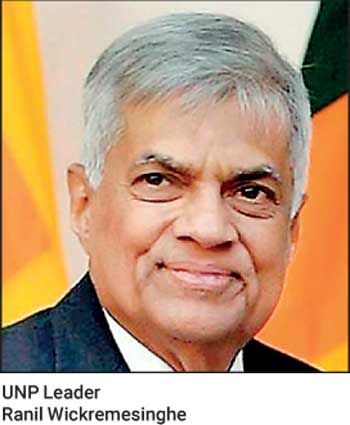Monday Feb 23, 2026
Monday Feb 23, 2026
Saturday, 14 August 2021 00:49 - - {{hitsCtrl.values.hits}}
 The United National Party (UNP) has unveiled 21 new policy proposals for the country to be healthy and economically secure.
The United National Party (UNP) has unveiled 21 new policy proposals for the country to be healthy and economically secure.
The UNP Working Committee unanimously adopted the 21-point plan. This will be distributed to all UNP Local Government members and party organisers for them to discuss with the public, the party said in a statement.
The UNP said copies of the plan would also be sent to the President and other relevant Government members as well as the Speaker of Parliament and leaders of other political parties.
These policies, consisting of 21 new proposals, are specifically aimed at controlling the COVID-19 pandemic. The plan, titled ‘The United National Party’s Policy for Health Security and Economic Security’, is as follows:
nTemporary field hospitals are to be constructed with the assistance of the Army and construction companies. This will include the provision of new beds for patients.
nThe Government must immediately seek international assistance in obtaining more ventilators and oxygen supplies for patients while these supplies must be airlifted.
• Obtain the services of retired medical professionals and private practitioners to assist the health services in the country.
• The procurement of vaccines must be increased, it is recommended that the procurement process for COVID-19 related matters be suspended, and an emergency procurement process be put in place.
• The vaccine program must be expanded to include children aged 12 upwards, with the approval of their parents.
• The vaccine program must be accelerated and a realistic time frame for the vaccine program must be established by the medical authorities.
• The PCR testing of the public must be increased.
• All members of the health service must undergo regular PCR testing and be provided with Personal Protective Equipment.
• Proper statistics must be maintained of those infected by COVID-19 and the deaths.
• There is no provision in the law for anti-COVID19 Task Forces. The powers are vested in the Cabinet of Ministers, the Disaster Management Council and the Director-General of the Health Services. The Task Force must be immediately abolished, and the Cabinet must assume responsibility. The Disaster Management Council comprising of relevant Ministers, Opposition Leader and officials must be convened. The Cabinet shall operate through them.
• A special advisory group of experts comprising of individuals recommended by the World Health Organization must be set up to assist the Cabinet.
• The Parliamentary Consultative Group on Health must meet on a weekly basis to provide an update to the Members of Parliament on the situation in the country regarding COVID-19.
• The lead role in all COVID-19 related matters must be taken by the medical authorities, with the military and other necessary institutions providing support. All anti-COVID-19 efforts must be under the direct control and supervision of the health experts in accordance with the Health Services Act.
• The Opposition drafted ‘Public Health Emergency Bill’ must be immediately enacted by Parliament. The Government’s ‘Coronavirus Disease 2019 (COVID-19) (Temporary Provisions)’, which provides partial relief, must also be enacted.
• The International Monetary Fund issued special drawing rights to member countries to enable them to provide resources to combat the COVID-19 pandemic. This fund provides additional financial resources for the health sector, therefore the $ 800 million allocated to Sri Lanka must be utilised for COVID expenditure including purchasing vaccines.
• The economy is under severe strain due to COVID-19 and the lack of foreign exchange reserves. There is no space for an emergency economic relief program, therefore the Government must immediately begin talks with the IMF to obtain the necessary funding.
• The public and private sector must adopt a Work From Home strategy to reduce the movement of the citizens.
• Usage of public transport must be limited to half capacity, and the public must be restricted to only essential travel.
• The country’s borders must be immediately closed to all non-vaccinated tourists.
• The Disaster Management Council must work out a plan for the education sector to ensure the resumption of safe schooling for children.